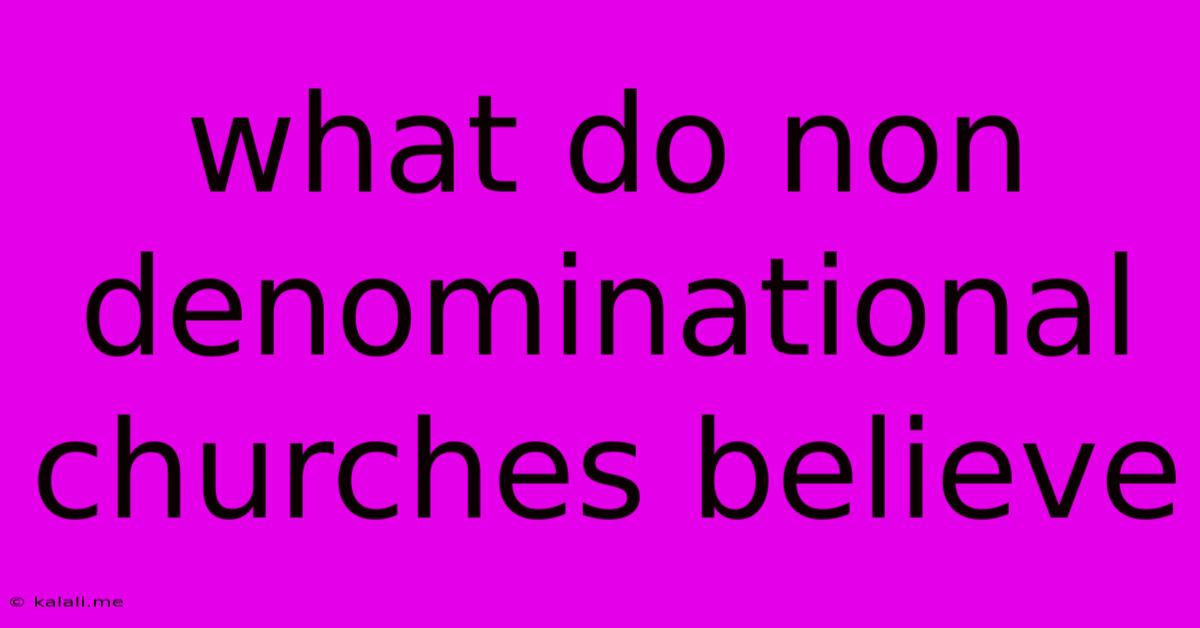What Do Non Denominational Churches Believe
Kalali
May 30, 2025 · 3 min read

Table of Contents
What Do Non-Denominational Churches Believe? A Look at Shared Beliefs and Practices
Meta Description: Curious about non-denominational churches? This article explores the core beliefs and practices common among these diverse congregations, highlighting their unifying themes and variations. Discover what unites them and what sets them apart.
Non-denominational churches have experienced significant growth in recent years, attracting individuals seeking a less formal and more flexible approach to Christianity. But what exactly do non-denominational churches believe? The answer isn't as simple as a single creed, as the term encompasses a wide range of congregations with varying theological perspectives. However, several common threads weave through their beliefs and practices.
Core Beliefs Shared Across Non-Denominational Churches
While specific doctrines may differ, most non-denominational churches share a foundation built upon these central tenets:
- The Bible as the ultimate authority: This is a cornerstone for nearly all non-denominational churches. They believe the Bible is the inspired Word of God, providing guidance for faith and life. Interpretations, however, can vary.
- The Trinity: The belief in one God existing in three persons – Father, Son (Jesus Christ), and Holy Spirit – is a widely held belief. This foundational doctrine shapes their understanding of God's nature and actions.
- Jesus Christ as Lord and Savior: The death, resurrection, and atoning sacrifice of Jesus Christ are central to their theology. They believe in salvation through faith in Jesus and his work on the cross.
- Salvation by grace through faith: This emphasizes God's initiative in salvation, not human merit. They often focus on God's unconditional love and forgiveness.
Practices Common in Non-Denominational Churches
The worship style and practices within non-denominational churches are often contemporary and less formal than traditional denominations. Common elements include:
- Contemporary Worship Music: Many incorporate modern music styles, often using praise bands and contemporary Christian music.
- Relevant Sermons: Sermons frequently focus on practical application of biblical principles to everyday life, making them relatable to modern audiences.
- Emphasis on Community: Building strong relationships and community among members is often a high priority.
- Missions and Outreach: Many actively engage in local and global mission work, reflecting a desire to share their faith.
Variations Within Non-Denominational Churches
It's crucial to understand that the lack of denominational affiliation doesn't imply a uniformity of belief. Significant variations exist regarding:
- Baptism: Practices range from believer's baptism (immersion) to sprinkling or pouring.
- The Lord's Supper (Communion): Frequency and interpretation vary, with some holding it weekly, others monthly or less often.
- Spiritual Gifts: Views on the manifestation of spiritual gifts (like prophecy or speaking in tongues) differ significantly, from embracing them enthusiastically to holding a more cautious or restrictive approach.
- Church Governance: Structures can vary from highly centralized leadership to more congregational models.
Finding the Right Fit: Understanding Individual Churches
Because of this diversity, it's essential to research individual non-denominational churches to understand their specific beliefs and practices. Visiting a church, attending a service, and speaking with members will provide a clearer picture of their theological stance and community culture. Don't rely solely on a church's name; delve deeper to find a congregation whose beliefs and practices align with your own spiritual journey.
This exploration offers a broad overview, highlighting common ground and acknowledging the diversity within non-denominational Christianity. Remember that each church is unique, emphasizing the importance of personal exploration and discovery in finding a faith community that resonates with you.
Latest Posts
Latest Posts
-
Can You Cook On A Rusty Grill
May 31, 2025
-
Word For Mix Of Traditional And Modern
May 31, 2025
-
Pi 4 Pi 5 E 6
May 31, 2025
-
What Is A 15 Minute Thermal Barrier
May 31, 2025
-
We Cannot Combine Declarative Sentences Using Logical Operators
May 31, 2025
Related Post
Thank you for visiting our website which covers about What Do Non Denominational Churches Believe . We hope the information provided has been useful to you. Feel free to contact us if you have any questions or need further assistance. See you next time and don't miss to bookmark.